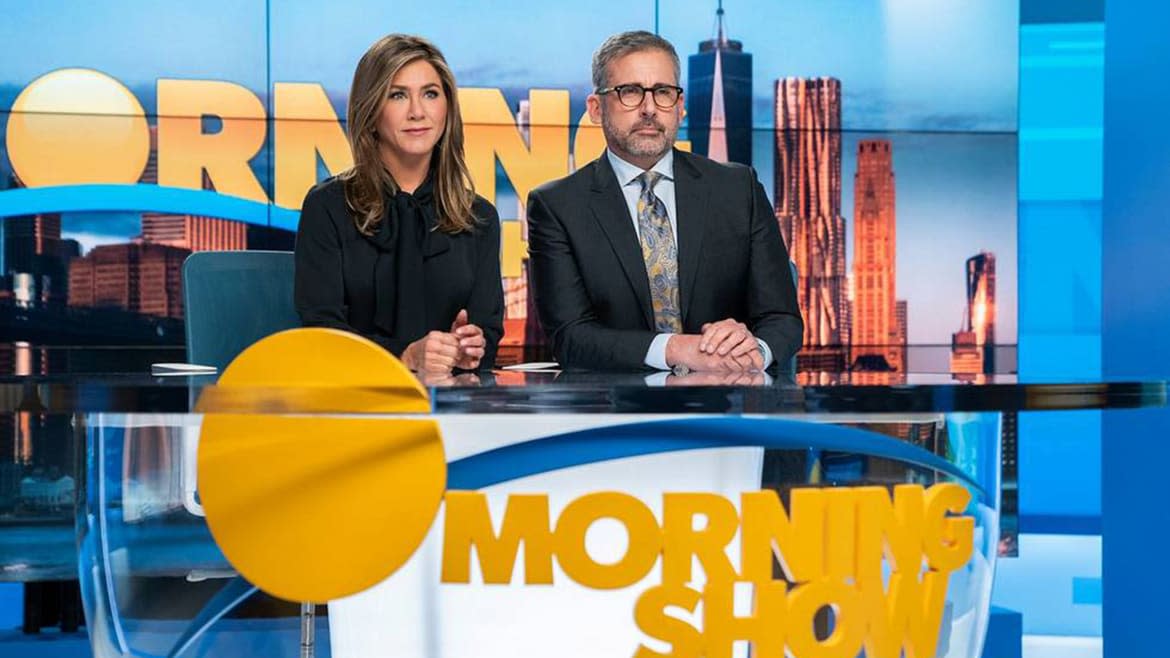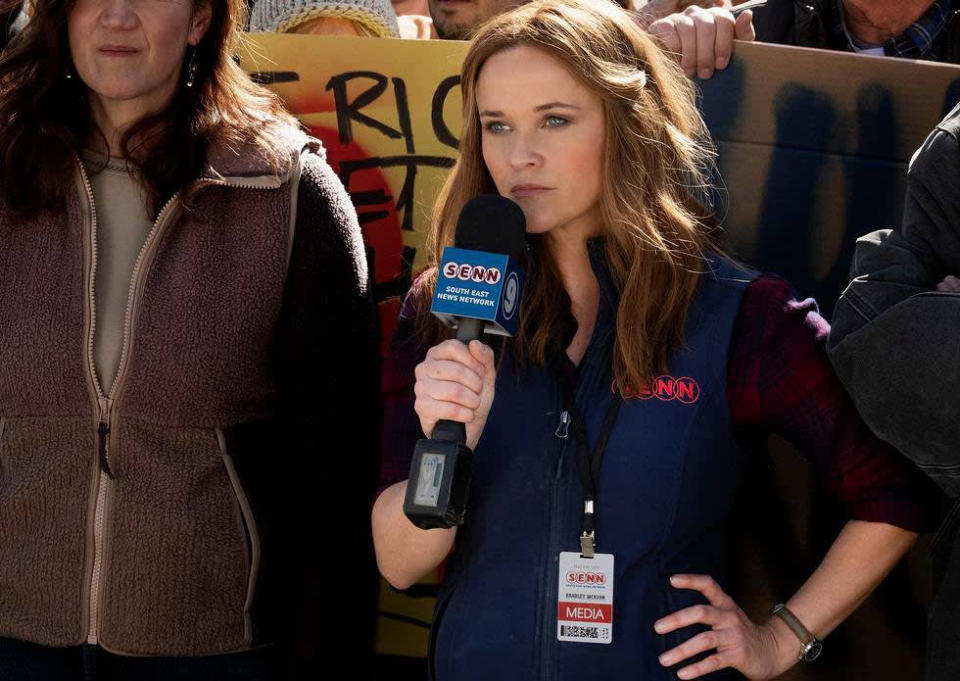‘The Morning Show’: A #MeToo Screed Against Matt Lauer That’s Almost Great

There are arguments to be made that The Morning Show is the biggest and most important series there is right now.
There is its status as the flagship program from Apple TV+, ushering in a wave of new streaming services that will multiply the already untenable number of TV options to a paralyzing quantity—and what its success could mean for these untested waters of abundance.
There is the unprecedented gathering of talent signaling the magnitude of this project, led by Jennifer Aniston, Reese Witherspoon, and Steve Carell and with an eye-popping ensemble of veterans and buzzy stars—Billy Crudup, Mark Duplass, Martin Short, Gugu Mbatha-Raw, Bel Powley—that rivals, if not surpasses, that of HBO’s Big Little Lies.
There is the staggering cost of the thing, a reported $15 million an episode totaling $300 million for the two seasons that Apple ordered upfront. As per-episode budgets go, that ranks it alongside Game of Thrones and The Crown as the most expensive TV series of all time, a factoid that might seem ludicrous as this isn’t a period piece or action epic, but a drama set largely inside a TV studio. Does that mean that this kind of price tag will be the norm? And does the show justify it?
There’s the fact that all of this hallowed glitz is being showered on the day’s trickiest topic: the #MeToo movement. Specifically, The Morning Show, which had been developed as a behind-the-scenes look inside the pressure cooker of morning news, evolved in response to actual news into a scathing rebuke of Matt Lauer and the systemic culture at NBC that coddled his alleged predatory behavior at the expense of women’s safety and careers, the network’s reputation, and the sanctity of the business.
And though time has stopped being measured in ways as traditional as, well, actual time, it is the major industry swing carrying the increasingly combustible TV business from one decade into the next—and possibly a new era, too.
Three episodes of The Morning Show debut on Apple TV+ on Friday, Nov. 1 and were given to critics to review, with subsequent episodes released on Fridays.
This has been a long preamble to say that, yes, it is very good. But is it as great as it should be, or needs to be?
At a time in the industry brimming with unknowns—from how consumers will embrace these new services to the very issues the series is exploring—that may be impossible to answer. And that ambiguity, those unknowns, might just be what everyone is banking on.
The series begins with a death, of sorts.
The Morning Show producer Chip Black, played by Mark Duplass, calls the show’s co-anchor, Mitch Kessler, Carell’s character, at 3 a.m. “Somebody better be dead, buddy,” he says. At 3:30, he then calls Alex Levy, played by Aniston, the Katie Couric to Mitch’s Matt Lauer. She ignores the call and all of his repeated attempts, until he finds her outside the studio when she arrives at dawn. “Oh my God,” she moans. “Who died?”
In effect, Mitch did. An article is being published accusing him of serial sexual misconduct. He is immediately fired from the show. Alex is going to have to go on air and address America, reconciling the fact that the man who’s been her on-air partner for over a decade is now, in their eyes, a sexual predator.
The Matt Lauer parallels are overt. Details are dropped throughout the first three episodes that horrifyingly resemble those reported in investigations, including a button under the desk that closes and locks Mitch’s office door. Also familiar is Mitch’s reaction, furious that he’s being treated as if he’s Harvey Weinstein when he insists that all of his sexual relationships were consensual.
“You know what? I didn’t rape anybody!” he screams. “I didn’t fire anybody. I didn’t jizz into a plant in front of somebody. You know what I did? I fucked a couple of PAs and assistants. Big fucking deal. They liked it. I mean who are we kidding?”
With Aniston’s character, Alex, there are echoes of the ways women in these situations are routinely devalued and kept out of the loop.
She is blindsided by the sexual-misconduct news and Mitch’s firing, even though network higher-ups knew about it. While exploring different circumstances, it is reminiscent of how Kelly Ripa was treated when ABC secretly orchestrated Michael Strahan’s promotion off Live With Kelly and Michael. Chip tells Alex she was kept in the dark so she could keep doing “what America needs you to do.”
“Fuck you, Chip, don’t you drag America into this,” she says. “They’ve got enough shit to deal with. This affects me. My on-air partner, my TV husband is a sexual predator now. What part of you thought that I should not have been involved in this conversation?”
Then there’s Reese Witherspoon’s character, a firecracker conservative-news outlet reporter named—and I’m serious—Bradley Jackson, whose life is upended when a clip of her berating a boorish man at a protest goes viral.
The head of the news division, Cory Ellison (Billy Crudup), uses Bradley to make Alex jealous, hoping to drive her off the show. What he doesn’t foresee is that, in an attempt to seize control of the situation, Alex uses Bradley as a pawn for her own gain.
In some ways, The Morning Show is unexpectedly a series about grief. Carell’s Mitch grieves the loss of his career and the overzealousness of #MeToo. Aniston’s Alex is grieving the loss of her sense of security, and, with it, control. Witherspoon is mourning the loss of her own agency. And everyone, in not-so-subtle ways, seems to be grieving something bigger: What is happening to journalism? America? To all of us?
A morning program is the catalyst for all of this big thinking because it is supposed to be an innocuous safe space, the comfort food. It’s upsetting when your comfort food gets soured, and even worse when it’s the first meal of the day. How do you come back from that?
The Morning Show isn’t offering comfortable takes on these issues.
Crudup’s Cory cheers what he calls the “Mitch-is-a-predator boost” to the ratings, but knows it’s fleeting because “people are getting used to their favorite cuddly men turning into monsters.” He’s excited to use it to aid his misogynistic cause: Pushing out Alex, who has gotten “stale.” As he sees it, “Watching a beloved woman’s breakdown is timeless American entertainment.”
Mitch likens the way the #MeToo movement has progressed to McCarthyism. Alex grapples with her own power: “Sometimes women can’t ask for control, so they have to take it.” Bradley wonders about her place in all of this as a journalist, beholden to the truth, “whether you’re writing for The Bumfuck Gazette or The New York Times.”
It’s a show that will piss off people allergic to earnestness as well as people allergic to showboating. And it will certainly piss off people susceptible to a certain kind of anaphylactic shock when those two approaches collide, like a toxic mixing of medication, in a discussion of #MeToo.
There are times when the male characters—Carell’s Mitch, Duplass’ Chip, Martin Short’s Woody Allen-esque director—are discussing the escalation of #MeToo and characterizing the accused men as victims of witch hunts when it’s unclear if the show is attempting a both-sides nuance of a worthwhile argument, or simply venting the frustrations of embittered, threatened men.
In fact, it’s a series that’s constantly venting: about journalism, about #MeToo, about sexism, about misogyny, about power, about Americans. There’s a sliding scale with gratifying on one end and exhausting on the other, and The Morning Show is constantly veering from one end to the other. There’s fun to be had in that. There’s also annoyance.
There are almost constant whiffs of very classy, intelligent people poking and prodding and preaching at you. When these arguments are as provocative and insightful as the creative team seems to believe, it’s fantastic. Delivered by a cast this stacked, how could it not be? But when it misses, the groan may as well be a foghorn. It can seem like a fool’s errand to engage in these issues in real-time, which is what makes the show both so impressive and susceptible to intense criticism.
In that sense, it’s a melodrama at a time when TV seems to have moved away from that, making it all the more peculiar and, in turn, fascinating that this is the tone of a show meant to herald the streaming service of the future.
Whatever you make of all this, there are aspects of the series that are undeniable. This is Jennifer Aniston’s show, bar none, and she’s seizing it. She’s fantastic. The high-octane nature of the narrative is such that every character is on the verge of blowing a gasket, but no one does that better than Aniston.
She gets her moments of levity, which, the comedy talent she is, she nails. But while her strength has always been in making kookiness alluring and magnetic, this is the most captivating she’s ever been in a dramatic role. She gets her very own Network-inspired “mad as hell” speech, spun through a feminist filter about male power and ego, that is outlandish and, yet, incredibly entertaining.
Casting Carell, as beloved as ever at the moment thanks to the streaming popularity of The Office, in a role like this is a stroke of genius, even if he’s not given as much to do. And Witherspoon is entertaining, though Bradley’s self-described feistiness loses its zeal as she loses just about all of her agency.
The Alex and Bradley All About Eve-style plot cycles through every stage of retrograde to empowering, and familiar to surprising. But that’s what’s most striking about The Morning Show. Its approach to a host of volatile issues isn’t singular, or easy, or even, it seems at times, aimed at actual targets. Reflecting a society with passionate opinions about these issues falling all across the board, maybe it knows there’s no such thing as crystallizing them all into a bullseye.

The irony is, though, we’re also at a time culturally and in the industry when bullseyes are required, especially when you’re talking about issues like these, or when you’re heralding a new TV era like this one is supposed to usher in.
It’s impossible to gauge, then, what The Morning Show’s impact will be. It’s good enough, and will start conversations. But in unforgiving times, what happens to a slight miss? For better and worse, that seems like a question the show itself would try to explore.
Got a tip? Send it to The Daily Beast here
Get our top stories in your inbox every day. Sign up now!
Daily Beast Membership: Beast Inside goes deeper on the stories that matter to you. Learn more.

